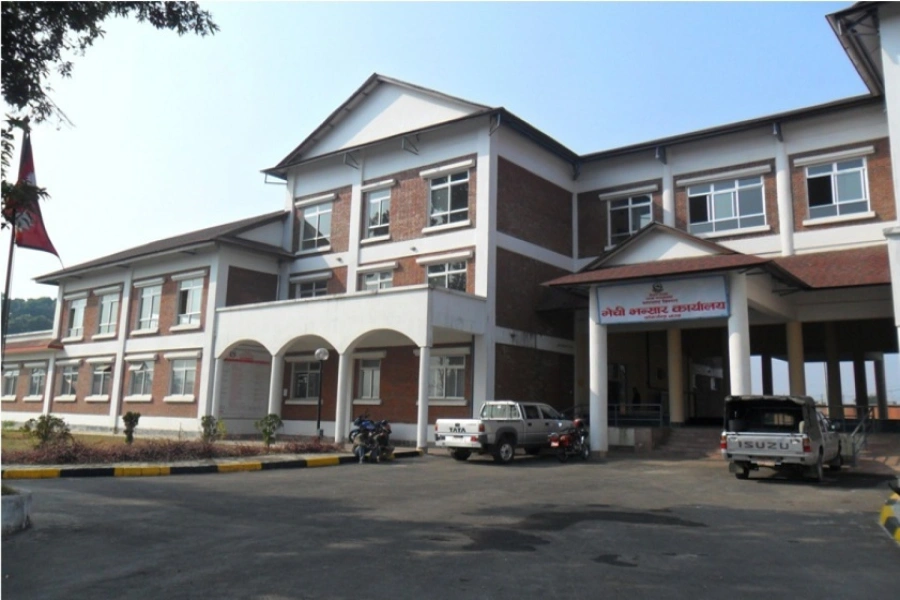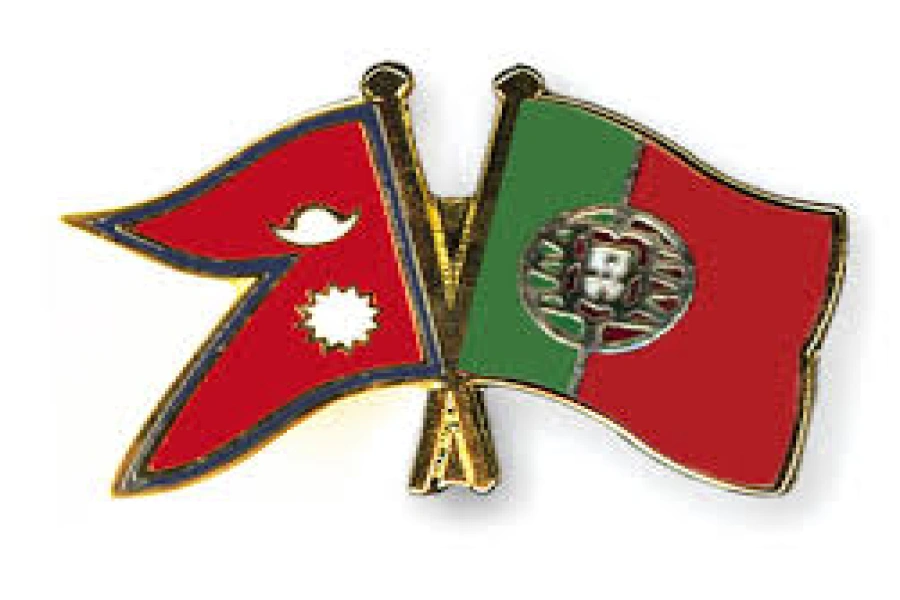The reason Chieftain Oli triumphed over all main players was simple: He wanted to be Prime Minister and was willing to do whatever it took to achieve that goal
Every Asoj 3 of Nepali calendar there is blip on the cardiogram of the controversial constitution as if to prove that the supreme law of the land is still alive. On the designated date, the head of government is driven in state to whatever remains of Tundikhel. In the afternoon, the presidential palace at Shital Niwas becomes a stage where lackeys of the regime and sundry other high and mighty rub shoulders with each other in a show of loyalty.
The day this year was remarkable for at least two unrelated outbursts. The most powerful salvo was fired by the ethno-national chieftain of Khas-Arya community and Prime Minister Khadga Prasad Sharma Oli. A few days before his scheduled departure to attend the United Nations General Assembly, Premier Oli thundered that he will not allow the state to be made a “guinea pig” in the name of civil liberties. There was nothing veiled in the text, tone or tenor of the threat. It was a statement of purpose plain and simple: The Oligarchy was determined to stifle domestic dissent and resolute about ignoring outside criticism.
The second bombast was even weirder. Playing a dissonant note from a public platform, Premier Oli’s fellow turncoat and former Maoist Pushpa Kamal Dahal pleaded with the international community to award him the Nobel Prize for Peace—no less—for his role in bringing the armed insurgency to a close. Given the strategic nature of most such prizes, however, it will not be a surprise if the revisionist revolutionary is conferred with the award.
After all, the Nobel was once given to Henry Kissinger, which had made an American commentator quip that it “made political satire obsolete.” The recent announcement of the Norwegian Nobel Committee that Aung San Suu Kyi won’t be stripped of her prize despite mass killings of Rohingyas in Burma under her watch indicates that geopolitical considerations carry significant weight in such decisions. Dahal perhaps realizes that it makes sense to aim for the Nobel even if a Magsaysay will be enough to acquire the approval of the capitalist world and may even induce the World Economic Forum to offer an invitation for their annual extravaganza at Davos!
An illustrious product of the School of Hard Knocks—he has served a jail term for 14 consecutive years—Premier Oli is an adroit player of realpolitik. His theoretical second-in-command—in practical terms, 2IC has little relevance in a Stalinist outfit that actively cultivates a cult of personality around its chieftain—and a self-described doer; Co-Chair Dahal is infamous for his utter contempt of academic pursuits. The two leading lights of the ruling alliance may have heard of the term “parliamentary cretinism”, but it’s extremely unlikely that they have examined the significance of the expression.
Over 1,500 empty cargo containers stuck at Birgunj dry port

“Parliamentary Cretinism,” says Sage Marx, “… confines its victims to an imaginary world and robs them of their senses, their recollection, their knowledge of the rude external world…” Though not exactly analogous, the idea of parliamentary cretinism has a parallel in the politics of plurality—the “Constitutional Cretinism”, a majoritarian infection that is likely to afflict the state and societies of Nepal for quite a while.
Democratic disorder
At the launching ceremony of Basant Basnet’s Bahattarko Bismaya, the Chairman of the-then Constitutional Political Dialogue and Consensus Committee of the successor body of the first Constituent Assembly in the history of the country stole the show by disclosing that he had heard from “the horse’s mouth” the real reason behind Indian displeasure with the Nepali charter. According to Bhattarai, Nepali leaders had promised a Hindu State and had pledged to award the construction contract of the fast-track roadway from Kathmandu to the southern plains to an Indian enterprise.
Given proclivities of the plutarchy in power in New Delhi for Hindutva proselytization and monetization of politics, allegations of Bhattarai don’t look baseless. However, true disclosures about the murky process of constitution-making were actually made by the-then President Rambaran Yadav. Perhaps for the first time in public, he admitted that he had been completely sidelined after the formation of what came to be called the Second Constituent Assembly. In a roundabout way, he distanced himself from the controversial constitution by claiming that his implorations were completely ignored by the drafters of the charter.
Compulsions of main characters behind the rush to promulgate a constitution in the middle of the devastating Gorkha Earthquakes weren’t difficult to guess. The Permanent Establishment of Nepal (PEON) wanted to seize the opportunity of the tremor mayhem to institutionalize the hegemony of Hindu, Aryan and Male Nepali Speakers (HAMNS) in the republican statute. Occupied with relief concerns, the international community was eager to wash its hands off the contested process.
Politically tired and terminally sick, the dotard at Baluwatar was in a hurry to leave a Koirala imprint on the constitution. He was lured with a combination of reward and punishment eventualities by the Oliars—a group of jingoistic, xenophobic and demagogic politicos loyal to ethno-nationalist chieftain Oli—of his own party. The incentive was that he will tower over his cousins in history books for having achieved what they had only dreamt: A statute framed by the representatives of the people. The stick was equally sharp—a failure to comply will lead to ouster by no confidence motion in the legislative assembly. Cornered, he meekly submitted and signed away the future of Nepali Congress party.
When he urged caution and pleaded for prudence, the gun of impeachment motion was pointed at President Yadav. Insults were hurled at him and all his past efforts of projecting himself as a model Madhesi, a typical mimic Khas-Arya person, were forgotten. More to hide his embarrassment than to show respect, he repeatedly bowed to the contested charter before presenting it to the people in the name of the Republic.
Sinking fast into the quicksand of parliamentary arithmetic, Dahal badly wanted a straw to cling. He expected a charter of whatever kind to legitimize his armed adventures. The reason Chieftain Oli triumphed over all main players was simple—he wanted to be Prime Minister and was willing to do whatever it took to achieve that goal. The quickest way to glory in orthodox societies is to play upon collective fears of change. Like flies falling into the web of a spider, Madhesis fell into his trap with no hope of extrication.
Mangled memories
About a month ago, a state-sponsored and donor-supported jamboree on the constitution of Nepal was held in a premier hotel in Kathmandu. From the head of state and the head of government, almost the entire establishment in Kathmandu attended the event. It was a program staged to show the provenance of the charter to the international community. The effort was an unqualified success; a lot of attendees would later testify that they had a gala time.
An assembly upon the theme of People’s Perception of the Constitution of Nepal 2015 last week was a two-day affair in Birgunj that had no government ministers, no noted academics, no star journalists and no foreign scholars. The place of honor on the stage was given to the families of martyrs of the Third Madhes Uprising and those survivors that were grievously wounded by the security forces of the state. The lost and vacant look of widows, children and the aged on the stage made Mahanth Thakur—the most prominent politico from Kathmandu present in the audience—declare that his grief has withered and tears have dried.
Three years ago, ethno-national entrepreneurs and proponents of majoritarian nationalism used the club of its numerical strength to clobber aspirations of Madhesis, Janajatis and Dalits. Among externalized groups, there are always two kinds of people. It is said of the Dalit movement in India that Mombatti (Candle) ones keep the light flickering while the Agarbatti (Incense stick) kind worship power.
Among the Madhesi intelligentsia, something similar is happening with Sandal Madhesis that are happy to protect the feet of political masters getting an edge over the Candle types keeping faith in the future of federalism and autonomy alive. But all it needs to burn a controversial statute is a single matchstick and even when the candle in the wind is extinguished, conviction lives and hope never dies.
If the charter is indeed alive, it will have to be amended almost in its entirety. If not, Janakpur may show the way in future. “What happens to the dream deferred,” asks Langston Hughes, and muses over possibilities, “May be it just sags/ Like a heavy load / Or does it explode?”








































